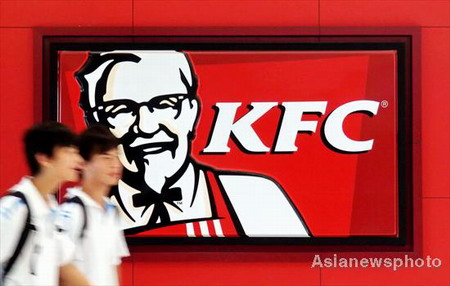Local firms vie for Yum's slice of China market
Updated: 2012-02-06 11:14
(Agencies)
|
|||||||||||
BEIJING - Four floors up overlooking the bustle of the cavernous Joy City Mall in Beijing, diners take a break from shopping to slurp noodles and nibble on dumplings at an Ajisen restaurant.
It's an increasingly common sight: Chinese consumers turning to local fast-food alternatives to the long-dominant pair in China -- Yum Brands Inc's KFC and McDonalds Corp.
Twenty-five years after Yum introduced China to American-style fast food with its first fried chicken store, the two US giants are facing a plethora of Chinese and Asian eatery chains that are steadily munching away at their market share.
 People pass a KFC billboard in Shanghai, June 30, 2011. [Photo / Asianewsphoto]
|
As Yum prepares to announce fourth-quarter earnings on Monday, some investors are eyeing its China operations warily. Last week saw a flurry of put options on Yum after McDonalds reported earnings and said foreign exchange fluctuations and other factors could eat into profits in 2012.
But Yum's China business seems robust. The company said on December 5 that it expects a benefit of $40 million this year from yuan-dollar exchange rates, while operating profit in China is expected to grow 15 percent. It plans to open 600 more locations in China in 2012 at a pace of more than one every day.
China accounted for 36 percent of Yum's global revenue in 2010 and is estimated to be 44 percent in 2011 and 50 percent in 2012, according to Credit Suisse.
Yum's biggest challenge comes from a rising torrent of competition as Chinese consumers increasingly have more money to spend and more places to spend it, which could mean slowing growth rates for Yum in the future.
At the Ajisen outlet, stacked above a Starbucks coffee shop and a Burger King restaurant, shoppers headed in and out all afternoon.
"We were just browsing, and stopped here by chance to eat," said Sun Haihao, 30, an engineer from Sichuan province who was visiting Beijing.
He's been to Ajisen, a Japanese-style restaurant run by Ajisen (China) holdings Ltd and KFC in Mianyang city where he lives. "KFC can be too oily," Sun said. "Ajisen is Asian, so we're used to it."
Growth outpaces China's GDP
A recent Reuters poll showed that economists expect China's GDP to grow 8.4 percent this year, down from 9.2 percent in 2011. Meanwhile the quick-service restaurant industry is expected to grow around 15 percent, meaning further revenue growth for Yum and McDonalds, even as their market share declines, according to market research firm Mintel. "KFC and McDonalds are growing outlet numbers, but so are domestic and foreign chains plus independents," says Paul French, Mintel's chief China analyst. "The pie is bigger, but the number of players wanting and getting a slice of it are bigger too. A rising tide does not necessarily raise all boats."
Ajisen is among the legion of upstarts, which include fellow Japanese entrant Yoshinoya; Burger King, Dairy Queen and Papa John's Pizza from the United States; South Korean-owned Paris Baguette and Tous Les Jours bakeries; and a host of Chinese chains such as Golden Jaguar, Yonghe King, Country Style Cooking, Dico's restaurants and 85 Degrees Bakery.
Many are growing fast, albeit from a smaller base. Ajisen (China) reported a boost in first-half restaurant income last August of 40.8 percent to HK$1.6 billion ($206 million).
Country Style Cooking, a family-style chain offering casual cuisine and focused on western China, increased its locations by 63 percent in 2011, according to China Market Research. Meanwhile, the number of all of Yum brand restaurants in China last year grew 13 percent.
Success story
Louisville, Kentucky-based Yum, whose restaurants in China also include Pizza Hut, East Dawning and a stake in Little Sheep, plus Taco Bell and others in the United States, has had remarkable success in China.
Related Stories
Yum! takeover proposal approved 2012-01-09 09:33
Yum! Brands signs deal with Sinopec 2011-11-23 16:01
Yum says China to be top profit driver this year 2010-12-09 10:55
China's Little Sheep devoured by Yum! 2011-05-14 09:17
- CNPC operates 16m cubic metre fuel storage
- City to relocate smelting plants after toxic spill
- Central Huijin plans for banks to cut dividend ratios
- China bans airlines into EU carbon scheme
- Work safety highlighted before leadership transition
- Water diversion project to be operational in '13
- Vanke Jan home sales tumble 40%
- SAIC revives Shanghai brand








